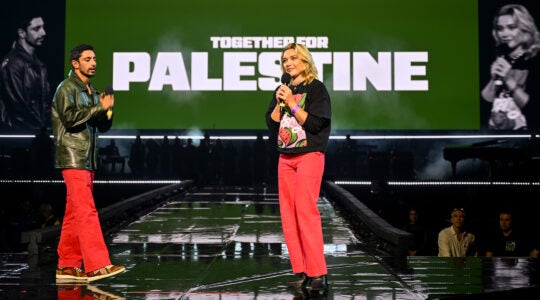MOSCOW (JTA) – When five soccer fans from the Moscow suburb of Solntsevo were arrested for shouting anti-Semitic slogans during a recent soccer match, they said they were “just kidding.”
Now they face up to two years behind bars for inciting racial hatred.
The case represents the first time that fans at a sporting event, and not just the teams at play, have been prosecuted in Russia for a hate crime. In this case, one of the teams may be fined as well.
Solntsevo prosecutor Alexei Klimov formally charged the five fans this week with committing a hate crime. They briefly were detained on Aug. 28 but released the same day and ordered to stay in town until the court hearing.
The offending incident took place in late April when the men, all in their early to mid-20s, noticed a poster advertising a match between Alliance, a local soccer team, and Moscow’s Jewish team, Maccabi. They showed up at the stadium wearing masks and waving a handmade banner reading “Happy Holocaust.” At one point during the match they started yelling, “Go to Auschwitz!”
Pavel Feldblyum, president of the Maccabi club, appeared as a witness when the defendants were questioned Aug. 28.
“I was stunned when I spoke to them,” Feldblyum said. “When I asked them about the Holocaust and Auschwitz, they appeared to have very little knowledge about either one. One of them bluntly admitted they just knew ‘these words were offensive for the Jews in some way.’ ”
Feldblyum said the men told authorities they were “just kidding” after learning they faced two years in prison.
Feldblyum credited the authorities’ strong response to the incident to the direct intervention of Moscow’s mayor, Yuri Luzhkov.
Prosecutors and investigators rarely use Article 282-1 of the Russian Criminal Code, which prohibits the incitement of racial hatred or humiliation, “because it is rather difficult to collect evidence and to prove the offender’s intentions,” Feldblyum said. “Yuri Luzhkov intervened personally because he not only knows our soccer club pretty well, but he is committed not to allow the expression of nationalistic sentiments in a megapolis where more than 100 ethnic groups reside.”
While the five men face criminal prosecution, the Alliance soccer club may be fined as much as $20,000 for its fans’ improper behavior.
The club claims no anti-Semitic behavior took place during the match.
“Yes, they shouted the usual rubbish like, you know, fans usually shout trying to intimidate a rival team,” Alliance president Alexei Vasilyev told the Moscow business daily Kommersant. “Yes, I admit their language was vulgar and rude. But they didn’t use the words ‘Jews,’ ‘Holocaust’ or anything like that.”
Vasilyev insisted his club’s fans would not express ill will toward Jews given that a player on their own team is Jewish.
Until recently in Russia, such outbursts resulted in small fines, if any punishment at all.
Law enforcement authorities typically look the other way even at large-scale demonstrations, such as the notorious “Russian March” two years ago during which the Movement Against Illegal Immigration and the ultranationalist Slavic Union organized a thousand-strong march in the streets of Moscow during the People’s Unity holiday on Nov. 4, 2005. Many marchers sported Nazi insignias and shouted “Heil Hitler.”
Even when fines are levied for anti-Semitic or racist behavior during soccer matches, usually they are levied against the club. This summer, for example, Spartak-Moscow was fined after its fans brandished a racist banner targeting a host team’s dark-skinned player during a game in the city of Samara. The fans themselves were not detained.
The Solntsevo case is the first one in Russia where the fans themselves were charged.
Vladimir Paley, the American Jewish Joint Distribution Committee’s director for special projects in Russia, told JTA he hoped the case would mark a new chapter in Russian law enforcement.
“Russian authorities may need to pacify various ethnic and religious groups in Russian society,” Paley said. “The Kremlin may want to show it guarantees security and dignity for every citizen regardless of origin and religious affiliation.
“Also, it may be a sign that Prosecutor General Yuri Chaika feels more self-confident now that President Putin gave him the authority to clear the scene of everything that can spoil the image of Russia as a prosperous country in advance of the upcoming parliamentary and presidential elections.”
Last year, at the height of Israel’s war in Lebanon, the Maccabi club donated $10,000 to communities in northern Israel to provide bomb shelters with air conditioning.
JTA has documented Jewish history in real-time for over a century. Keep our journalism strong by joining us in supporting independent, award-winning reporting.





